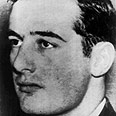
Wallenberg as role model
Op-ed: In era of dubious human rights activists, Raoul Wallenberg should be celebrated
In 2012, the 100th birthday of Swedish diplomat Raoul Wallenberg will be commemorated. His rescue activities in occupied Budapest at the end of World War II saved many Jews. Publicity after the war has generally focused on Wallenberg’s arrest and imprisonment by the Soviets in January 1945. Details of what has happened to him since, including where and when he died, are still unclear.
Beyond his historical merits, Wallenberg’s story could become increasingly important nowadays for several reasons. One is the contrast between him and many of today’s human rights activists. Wallenberg was not a promoter of tolerance, but a savior of many lives. Wallenberg risked his life by his own volition under the Nazi regime - the most brutal government Europe has known in modern times.
In our day, many prejudiced activists have pervaded the human rights movement. Just one example: Human Rights Watch has become tainted by various acts of whitewashing of Libya’s regime while Gaddafi was in power. This type of behavior increases the potential importance of Wallenberg as a shining example of what true humanitarianism means.
Contemporary society is in great need of courageous people as role models. Educators need examples of people who did the right thing at a time when there were many others who committed extreme crimes, collaborated with criminals, or just closed their eyes and stood by passively.
In some countries Wallenberg’s memory is honored, in others much less so. He has posthumously become an honorary citizen of the United States, Canada, Hungary and Israel. Streets have been named after him. There are Wallenberg memorials in many towns including Tel Aviv. Yet memorializing the activities of a person is not as meaningful as presenting him as a role model in contemporary self-centered societies.
Soviet crimes
A second issue of importance is to publicize the Soviet Union’s crimes against Wallenberg and to illustrate the dubious role played by the Swedish government after World War II. Sweden did not give Wallenberg the honor he merited. The country also barely inquired into what became of its courageous national. The Swedish government was even offered help by the Americans to find out more, but refused the offer.
A particularly negative role was played by the Swedish Ambassador in Moscow, Staffan Soderblom. He had a unique occasion to meet Stalin and Soviet Foreign Minister Molotov in 1946. Instead of asking for information about Wallenberg’s fate, Soderblom said that he knew he was dead. This was most likely untrue at the time. The message to the Soviets was obvious: Sweden would not make demands upon them concerning Wallenberg.
The Swedish government changed its attitude toward Raoul Wallenberg only by the turn of the century. Olle Wästberg, the coordinator of next year’s Wallenberg memorial project, recently mentioned on TV that Wallenberg is less known in Sweden than in countries such as Argentina, Canada, Israel and the United States.
Sweden has announced that 2012 will be the “Raoul Wallenberg year.” A stamp will be issued in his memory. A travelling exhibition will be prepared. A book on his life will be written by two authors on behalf of the government. One wonders whether the book will whitewash somewhat Sweden’s past.
Wallenberg’s niece, Louise von Dardel, told me that the overall budget devoted to Raoul’s commemoration is very low. Most activities will be private initiatives. She also mentioned that his name does not appear in the country’s history schoolbooks.
Swedish Foreign Minister Carl Bildt is Chairman of the National Committee in charge of Wallenberg’s commemoration. This was an unfortunate choice. Bildt supports an extreme Swedish government-financed pro-Palestinian group that has terrorist links. He has to be watched carefully to make sure he won’t abuse the memory of an exceptionally good human being who saved Jews. Bildt may well claim that as he devotes time to honor an important rescuer of Jews, this excludes his being an anti-Semite in its new anti-Israeli dimension.
One can only hope that not only Israel, but also Jewish communities around the world will make a major effort to give Wallenberg’s memory the attention it well deserves. Very few people in history went to such lengths in order to save so many Jews from certain death.
Dr. Manfred Gerstenfeld is Chairman of the Jerusalem Center for Public Affairs. His book “Behind the Humanitarian Mask: The Nordic Countries, Israel and the Jews,” can be downloaded for free here










